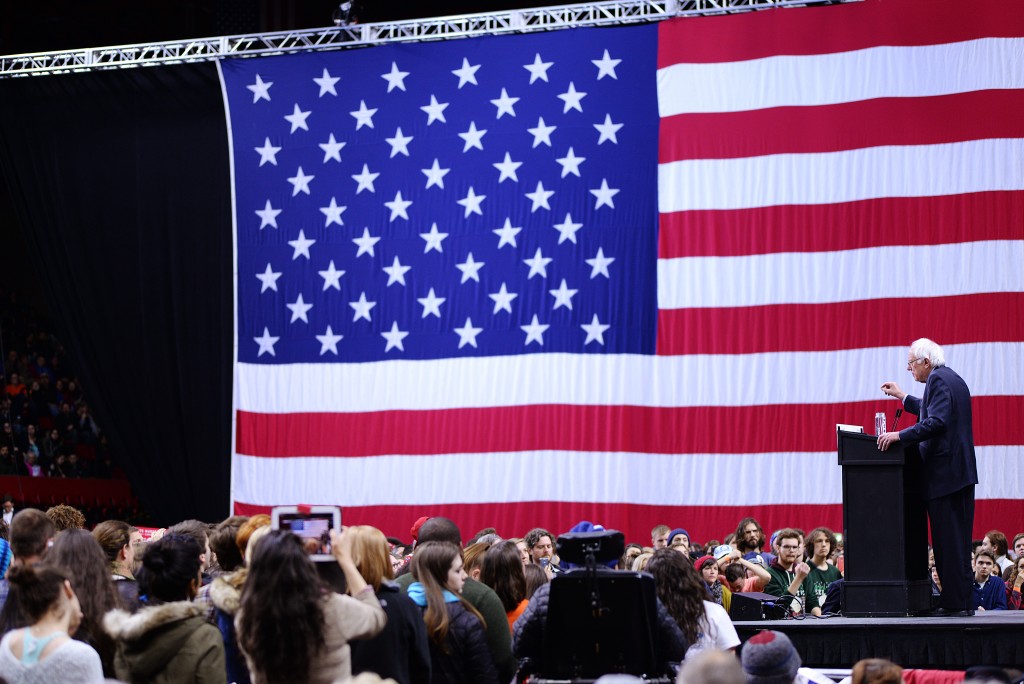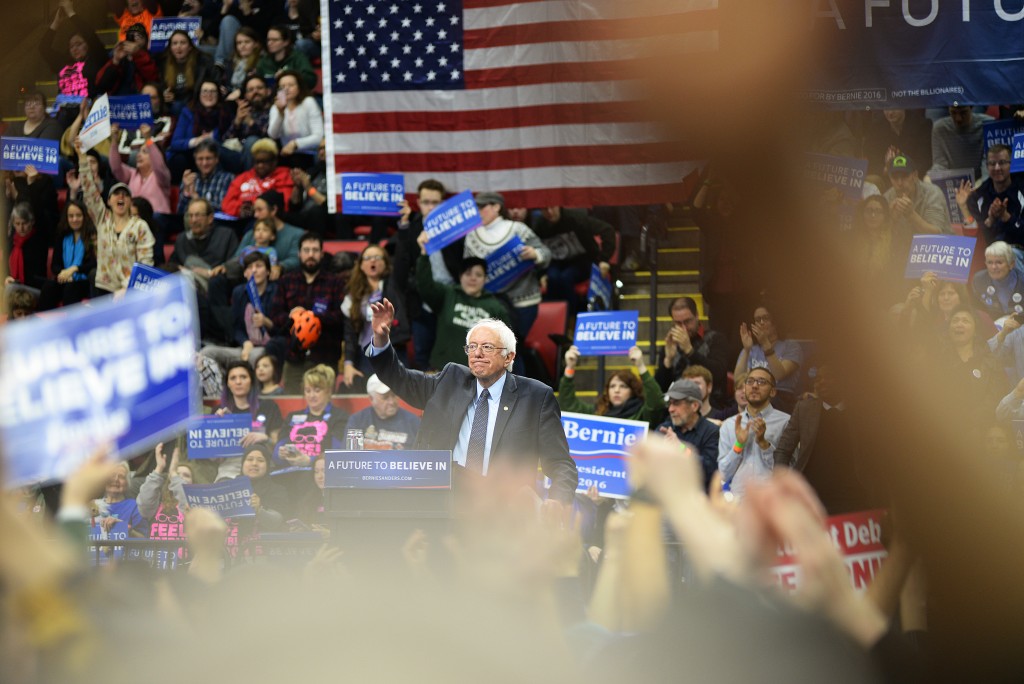
“Are you guys ready for a political revolution? Are you ready to transform America?”
Sen. Bernie Sanders posed these questions to what he called a “large, loud and raucous” crowd of more than 5,000 on Monday morning. Attendees filled the Floyd L. Maines Veterans Arena in Downtown Binghamton, while more than 100 were left to watch from screens outside.
Multiple speakers opened for Sanders, voicing support for the 2016 presidential candidate and addressing issues such as minimum wage and workers’ rights. Conrad Taylor, a Binghamton city councilman representing the fourth district and a sophomore majoring in political science at Binghamton University, was among them. He commended Sanders for making Binghamton a stop on his campaign route.
“The Southern Tier is an area of our state that does not often receive the attention that it deserves,” Taylor said. “We are marginalized by state officials and forgotten by the corporations that we helped create. Bernie Sanders is the first presidential candidate in 2016 to come to the Southern Tier because he is the first presidential candidate in 2016 to care about the Southern Tier.”
Taylor also highlighted his age, and encouraged his peers to take the election season seriously and understand politicians’ stances on important issues.
“[Young people] are forced to look far into the future,” Taylor said. “We need to find a candidate who can address today’s problems but will also recognize the problems of tomorrow.”
Josh Fox, an anti-fracking activist and director of anti-fracking documentary “Gasland,” was the final speaker before Sanders. He praised the senator’s concerns for climate change, his refusal to support the fossil fuel industry and his devotion to transparency.
“We also know that the truth is irrepressible,” Fox said. “You are proving that today. You are proving that the creativity and love and resilience and innovation and community and human rights are irrepressible. It is so because you make it so.”
As Sanders took the stage, cheers echoed throughout the Arena. As voices died down, he prepared the audience for his coming messages.
“We’ve been doing something extremely radical,” Sanders said. “We’ve been telling the American people the truth. The truth is not always pleasant, it’s not always something that we want to hear. But it’s necessary that we do hear it, or else we will not make any of the changes that we need.”
Sanders’ speech touched on areas ranging from employment to education, and also catered to his mainly college-aged audience.
“What we have seen around this campaign is young people understand the simple truth: you are the future of this country,” Sanders said. “You have every right in the world to fight to make sure that that future works for you.”
He shared an anecdote about his family, which set the tone for his positions on providing equal opportunities. Sanders, a self-proclaimed product of the American Dream, said his parents exemplified the hardworking mentality that is so often referenced in political rhetoric.
“[My father] and my mom worked very hard to make sure that their two kids did better than they did,” Sanders said. “And that’s the dream that millions and millions of people have experienced. And I will be damned if we’re going to see the American Dream die.”
Sanders targeted the prison system, criticizing the United States’ high levels of incarceration, which according to him is a poor allocation of resources.
“Here is a not-so-radical idea,” Sanders said. “We are going to invest in our young people in jobs and education. We are going to invest in jobs and education, not jails and incarceration.”
In the same vein, Sanders shared plans for ending private prison ownership, increasing diversity within the police force and decriminalizing marijuana from its current status as a Schedule I substance by the Drug Enforcement Administration.
“We can argue the pluses and minuses of marijuana but nobody, no sane person, thinks that marijuana is equivalent to heroin,” Sanders said. “Possession of marijuana should not be a federal crime.”
Hillary Clinton, who is competing with Sanders for the Democratic nomination, also lent fuel to Sanders’ speech. He pointed out campaigning differences, such as his refusal to accept funding from Wall Street executives, as examples of his sincere devotion to political revolution.
“Since this campaign has begun, we have received over 6 million contributions from 2 million people — unprecedented in the history of the United States of America,” Sanders said. “We can run a winning national campaign without being dependent on the big-money interests.”
Sanders also said his campaign was listening to the concerns of marginalized groups such as Latinos and women, highlighting how he will prioritize immigration reform and wage equality. Then, stressing finances with a different focus, Sanders touched on his plans to alleviate student debt and make education more affordable.
“When we understand that in many respects a college degree is the equivalent of what a high school degree was 50 years ago, we have got to extend the concept of public education and make public colleges and universities tuition-free,” Sanders said.
Many BU students woke up way earlier than they would on a usual Monday morning to see the senator speak. Some, like Michael Barber, a senior majoring in environmental science, came to the Arena regardless of their personal political affiliation.
“It’s important to be a part of the process, and part of the process is listening to a candidate,” Barber said. “I personally am probably not going to vote for Bernie, but I’m willing to come out and see a possible future president. Maybe I’ll be inspired and my mind will be changed.”
Joel Mora, a junior triple-majoring in Arabic, biological anthropology and Spanish, said that it was important that Sanders see the Southern Tier is behind him.
“We came to show our support for Bernie Sanders because he’s kind of a polemic figure in our modern times,” Mora said. “I found myself in strong support for his political views and I wanted to show him that he has a constituency in this particular geographic region and in New York state as a whole.”
Toward the end of his speech, Sanders stressed the importance of voter support and participation for his campaign’s success. The senator started the rally with questions and ended with a plea.
“What I have learned throughout this campaign is that when there is a large voter turnout, we win; when there is a low voter turnout, we lose,” Sanders said. “My request to all of you is to not only come out and vote, but bring your friends and your families and your coworkers and if we can win here in New York state, I believe we are on our way to the White House.”



